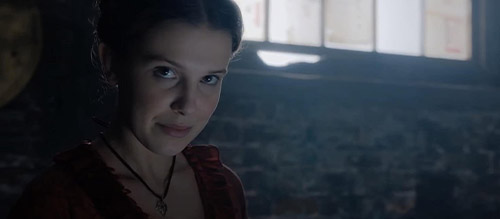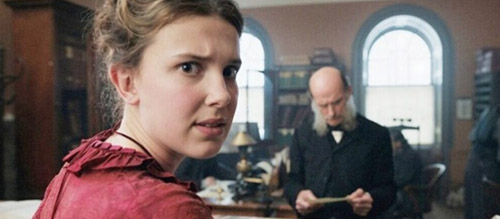Enola Holmes (2020) Review
Enola Holmes (2020)
Director: Harry Bradbeer
Screenwriter: Jack Thorne
Starring: Millie Bobby Brown, Henry Cavill, Sam Claflin, Louis Partridge, Fiona Shaw, Susan Wokoma, Frances de la Tour, Helena Bonham Carter
“He’s worth more, but you give me greater pleasure.”
Harry Bradbeer’s feature film debut depicts a modern take on an old tale. Adapted from the first of Nancy Springer’s six-book series, “The Enola Holmes Mysteries”, Enola Holmes twists the timeless narrative of detective Sherlock Holmes and puts his intrepid kid sister at the forefront. Set in the late 19th century to coincide with Arthur Conan Doyle’s original creation, 16-year-old Enola takes on the case of her missing mother.
First and foremost, it is worth noting that Enola Holmes offers typical elements of Harry Bradbeer’s directing, with ‘Fleabag’-esque breaks of the fourth wall and frequent narration from the lead character. Much like ‘Fleabag’, it is endearing rather than grating and offers a sweet but sincere perspective of Enola’s troubles as a young woman in 1890s England. Enola plays the part of a young woman not wanting to be led by the choices of others, in the same way that Bradbeer’s work on ‘Fleabag’ and ‘Killing Eve’ presents. Armed with a sharp mind, masterful jujitsu skills and talents in deduction that would rival her brother Sherlock (Henry Cavill), Enola sets out to claim her own path whilst on the hunt for her mother who has mysteriously vanished; much to the disappointment of her elder brother, Mycroft (Sam Claflin), who insist she take refuge at a boarding school to get her fantastical whims “educated out of her”.
Millie Bobby Brown is the perfect choice for the role of Enola, with her charming enthusiasm shining throughout the film. Brown takes on the solemnity and action of Enola Holmes’ narrative with great professionalism, much like her work in ‘Stranger Things’ and Godzilla: King of the Monsters (2019). Brown is an example of an exceptional young actress who clearly aims to show off the best of her characters, with Enola Holmes offering not just entertainment, but education and insight for those who have been in a similar situation of oppression and repression. “You don’t know what it is to be without power”, Edith (Susan Wokoma), a close friend of Enola’s mother, states to Sherlock Holmes; a heartfelt declaration on behalf of generations of women who have fought the power of an immovable patriarchy.
In comparison to previous adaptations of Conan Doyle’s works, such as the highly-rated BBC show ‘Sherlock’, Guy Ritchie’s Sherlock Holmes franchise and the flop that was Holmes and Watson, Enola Holmes does feel as though it is lacking somewhere. It seems that the Westernised representations of this beloved British detective have shrouded the view that a woman could take his place, a point that is made in the conclusion of the film when Enola manages to solve a mystery before Sherlock. Jack Thorne’s screenplay puts Enola at the helm of this progressive story pushing her co-stars to be nothing more than supporting actors. With frequent suggestions that Enola should create her own future and follow her own path, the film’s creators throw hints to their audience to not settle for what history set out; Enola characteristically and confidently making up her own mind on the rules and restrictions set out by those before her. This refreshing notion is something that many have become accustomed to this past year, with continuous learning, self-development and education being at the forefront of people’s minds. There remains, however, a feeling that stones remain unturned, that character dynamics remain unexplored and that there’s room for development.
That said, Enola Holmes joins a host of 21st century female-fronted cinema that brings societal issues and gendered oppression to the forefront, with the likes of Little Women (2019), Emma. (2020) and The Favourite (2018) also showing us that women can do it just as good – if not better – than men. If there is one thing to take away from Enola Holmes, it is the notion that we often go searching for something we deem to be lost, when in fact, what you seek is yourself.
15/24



